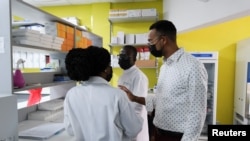World Cancer Day is Saturday, February 4, calling attention to the cancer-related nearly 10 million deaths in 2020, according to the World Health Organization. And the day also highlights advances in fighting it.
Here are some of the promising recent developments in diagnosing and treating the disease:
- Immunotherapy -
Immunotherapy drugs, which stimulate the immune system to track down and kill cancerous cells, have been one the biggest advances in cancer treatment over the last decade.
With fewer severe side effects than chemotherapy, immunotherapy has had a profound effect on the treatment of several types of cancer.
Before 2010, the survival rate for people with severe cases of the skin cancer melanoma was very low. But thanks to immunotherapy drugs, some patients can now live for 10 years or more.
However not all tumors respond to immunotherapy, which has its own side effects.
"We are only at the beginning of immunotherapy," said Bruno Quesnel, research director at France's National Cancer Institute.
Pierre Saintigny, an oncologist at France's Leon Berard cancer centre, said that different kinds of immunotherapy treatments will need to be combined "as intelligently as possible."
"With immunotherapy, we have moved up a level in cancer treatment, but steps still need to be taken for all the patients who do not benefit from it," he added.
- CAR-T therapy -
CAR-T therapy involves taking the T-cells from the blood of an individual patient and modifying them in a laboratory.
Then the T-cells, which are part of the immune system, are injected back into the patient, newly trained to target cancerous cells.
Another technique called Allogeneic CAR-T involves getting the cells from a different, healthy person.
So far, CAR-T therapies have mainly been effective against some kinds of leukemia, and the process remains very expensive.
- Artificial intelligence -
Computer programs using artificial intelligence (AI) have been shown to identify brain and breast cancer from routine scans with more accuracy than humans.
With AI research booming across a range of fields, it is expected to play an increasing role in other ways to diagnose cancer.
"Thanks to artificial intelligence, we will be able to identify which patients can benefit from shorter treatment," said Fabrice Andre, an oncologist France's Gustave Roussy cancer institute.
This would mean fewer side effects for patients, and a lower burden on the health system.
- Liquid biopsy testing -
Liquid biopsies are able to detect cancer in DNA from a simple blood test, which is easier and less invasive than traditional biopsies which require a tissue simple.
Quicker and easier testing would help doctors detect and act against cancer before it has the chance to spread.
The new technique is now being used in the United States, "but there are still a lot of false positives," Andre said.
- Vaccines -
There have long been vaccines available to protect against the human papillomavirus (HPV), which causes cervical cancer, and hepatitis B which can lead to liver cancer.
But after decades of failed efforts towards a cancer vaccine, hopes have risen that the mRNA technology pioneered for Covid-19 vaccines could also lead to a breakthrough in cancer.
Vaccines that treat -- rather than prevent -- cancer have been the most promising in development.
In December, the drug makers Moderna and Merck announced positive early trial results for their personalized mRNA vaccine to treat skin cancer patients.
And last month, German pharmaceutical BioNTech said that 10,000 people in Britain would be part of a trial for a mRNA cancer vaccine that would be tailored to individual tumors.
- A personal combination -
Steven Le Gouill, the head of the hospital group at France's Curie Institute, said he was optimistic for the future of cancer treatment.
Ideally, we will "combine all these approaches and new therapies to have a personalized plan for the patient," he said.
"We have passed a milestone in our understanding of the tumor cell," he said.
"Cancer remains an ordeal, but progress has been made -- exponentially."
